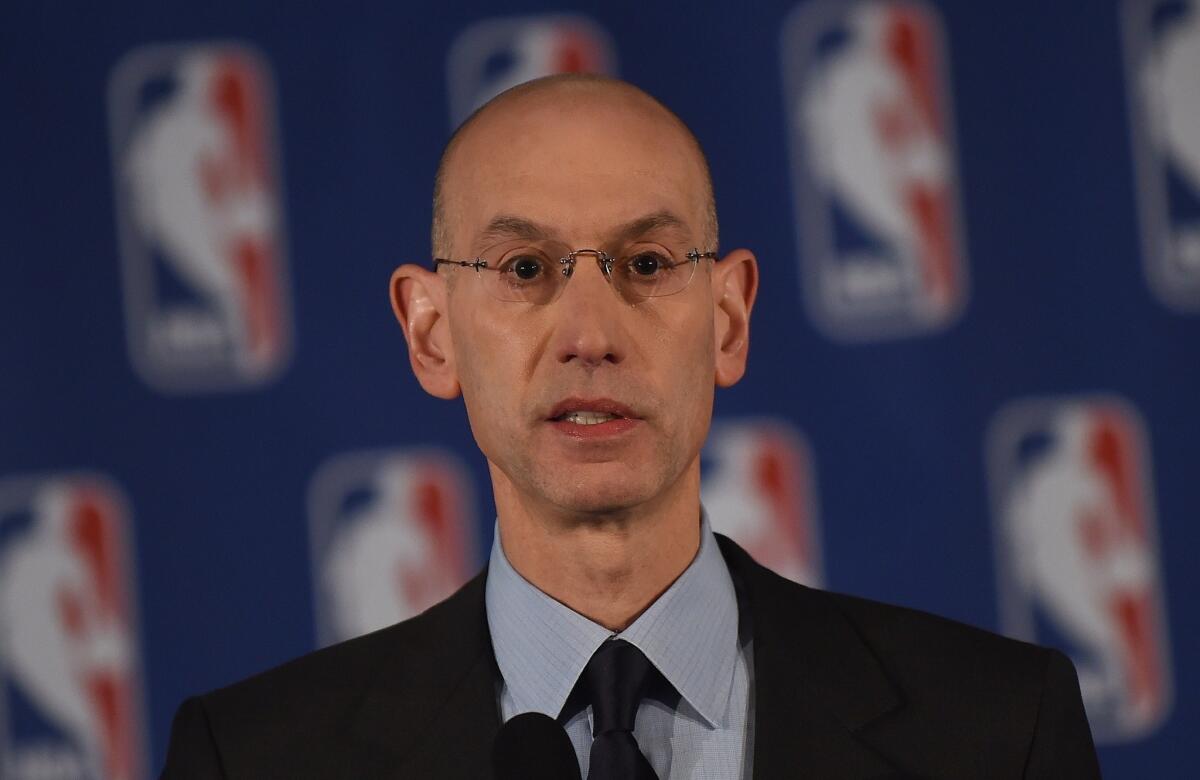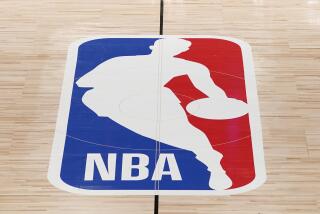The Sterling scandal: What it takes to get banned for life by the NBA

- Share via
We now know where the National Basketball Assn. draws the line.
More than three decades of the most atrociously inept team management and team play on the court weren’t enough for the NBA to reconsider Donald Sterling’s ownership of the Los Angeles Clippers. Repeated reports of racist language and behavior directed at Sterling’s managers, coaches and players? Not enough.
Repeated accusations of racist behavior in Sterling’s professional life? The NBA followed these matters “closely,” NBA Commissioner Adam Silver said at his news conference Tuesday. But the league let them go.
Now that Sterling has been caught on tape uttering sentiments that could have come as no surprise to his fellow owners, much less his players and other employees, now that the spotlight is on, commercial sponsors are pulling out and the threat of a fan boycott looms, Sterling’s out for life. Conveniently, the announcement comes a few hours before a Clippers home game that might otherwise have been really interesting.
Make no mistake, Sterling deserves to be out for life. But he deserved it long ago. The league condoned his behavior, and condoned his open efforts to maintain one of its valued franchises, located in a town of ferocious basketball fans, as a certified doormat.
Well, OK.
As I wrote over the weekend, when the Sterling affair first broke:
“Nothing will prompt the leagues to take action against a misbehaving owner until and unless they perceive that the behavior is costing them money. An owner who loses a stadium deal? That would do it. An owner who provokes a fan boycott that actually empties the stands? That would do it.”
That’s what did it.
The league didn’t care about Sterling in the past because no one really cared about the Clippers. Why should they? Every other team surely appreciated having an opponent that could be depended on to lose two out of three games. The Clippers didn’t cost the other owners anything -- the team’s value rose inexorably, like the others, from the $12 million Sterling spent in 1981 to its $600 million-$700 million estimated value today -- a benchmark proving that a rising tide lifts even garbage scows in the modern NBA.
Notwithstanding the lifetime ban and $2.5-million fine the NBA has imposed on Sterling, the league may not yet escape a great deal of pain for harboring this awful owner in its bosom for 33 years. The ban is plainly designed to make owning the Clippers no fun at all for Sterling. He can’t hang out with the team or haunt its practice sessions or games. He’s barred from personnel decisions, so he can no longer treat his on-court and off-court employees with the contempt and condescension in which he obviously wallowed. He can’t bask in the glory of being an NBA team owner, because he’s on the outs.
But even if the league’s owners vote to require that Sterling sell the team, as Commissioner Silver will ask, there will be a lot of details to resolve.
It’s doubtful that the league can mandate a sale at any given price; what happens if Sterling holds out for more than is offered? Another question is how the team will be managed in the interim, while a buyer is sought. Pro leagues have managed teams under receivership in the past -- this happened to the Montreal Expos, for example. But it’s not a stable, long-term condition, especially when the bills for contracts and other expenses have to be presented to an owner who is, ahem, “banned for life.”
In other words, if Sterling wants to stand fast, he can still cause the NBA a whole lot of embarrassment. And you know what? The league deserves it.
Commissioner Silver spoke today of his “personal outrage” at Sterling’s sentiments, as expressed on tape. He was “personally distraught” at these “hateful opinions,” he said. “Deeply offensive and hurtful,” he called them. The league didn’t take into account Sterling’s “past behavior,” he said, but in considering its next steps it will consider “a lifetime of behavior.” He says the league’s action today shows the principles it stands for.
Right. We know what the NBA stands for, because we know what it’s accepted for the last 33 years.
More to Read
Inside the business of entertainment
The Wide Shot brings you news, analysis and insights on everything from streaming wars to production — and what it all means for the future.
You may occasionally receive promotional content from the Los Angeles Times.











